Study in British Columbia
Universities and colleges in British Columbia are consistently ranked among the top-ranked institutions in Canada, with many also renowned globally.
The highly integrated education system in British Columbia is a global model for progressive, flexible education. In addition, the province provides a wide array of employment and immigration options once you have completed your studies.
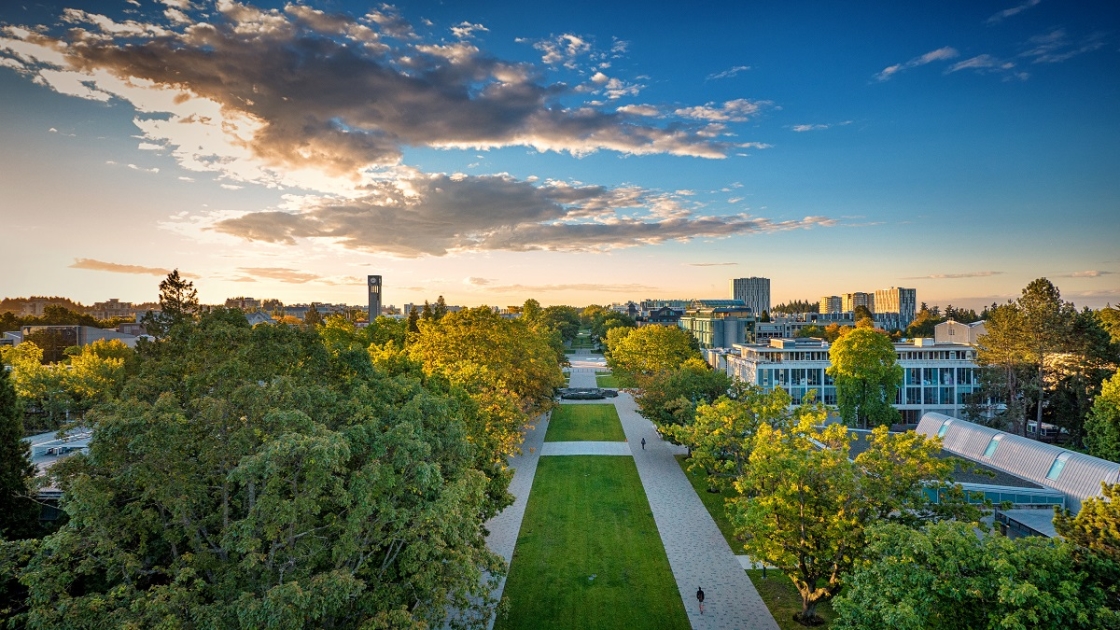
With its cosmopolitan cities, lush rainforests, coastal waters, and colossal mountains, British Columbia is one of Canada’s most exciting and beautiful provinces. B.C. is a peaceful and rewarding place to live and study.
Got a question about studying in British Columbia? Our comprehensive Studying in British Columbia FAQ page has the answers. If your question is not included, please contact us today and submit your question.
Population
4.7 million
International Student Population
96,516 (2014 figures)
Location

Main Study Destinations
Vancouver, Victoria, Kelowna
Studying in British Columbia: The Advantages
The B.C. Transfer System
British Columbia has far and away the best credit transfer program in Canada. The B.C. Transfer System allows students to undertake studies at one school and then transfer seamlessly to another, allowing for easier 2nd or 3rd year admission to some of the most competitive universities in the country.
Education Quality Assessment
British Columbia is the only provincial government that endorses certain schools under an “Education Quality Assessment”. This helps international students choose schools that they may not have visited before, and offers them some consumer protection.
Employment Options After Graduation
British Columbia has a diverse and growing economy, with a broad range of employment opportunities for graduates upon completion of their studies in the province. B.C. is projected to have the highest level of job growth in Canada over the coming years.
Moderate Climate
British Columbia's climate is influenced by the Pacific Ocean and mountain ranges. Areas along the south coast have a mild climate year-round. Summers on the coast are warm, with daytime temperatures around 20°C or higher. B.C.'s coastal regions have the mildest winters in all of Canada, and, unlike most of Canada, temperatures rarely drop below freezing.
Immigrate After Studying in British Columbia
The BC PNP International Post-Graduate Category
Graduates from an eligible B.C. public post-secondary institution with an eligible Master's or Doctorate (PhD) Degree in the natural, applied, or health sciences may apply to this immigration category without first obtaining a job offer. Individuals with graduate degrees in the sciences are highly sought after by employers in the technology, health care and other sectors.
The BC PNP International Graduate Category
Graduates from an eligible Canadian, public, post-secondary institution, with an eligible degree, diploma or certificate within the past three years may be eligible to apply under this immigration category.
Express Entry
Candidates for immigration to Canada through the federal Express Entry immigration selection system who have completed their education at a school in British Columbia may be awarded a significant number of points on account of their high level of education. Moreover, international graduates of Canadian educational institutions may have obtained important Canadian work experience, another highly valued factor under the Express Entry system.
Destination Schools in British Columbia
These institutions are featured due to their size, proximity to urban centres, and tradition for enrolling international students into their student bodies. Learn more about each school by clicking their titles below, which will take you to the relevant page on School Search.
Simon Fraser University
Simon Fraser University has been ranked by the Times Higher Education list as one the top 100 universities under 50 years old in the world. Established in 1965, the university is no longer on this list for 2017.
Signature programs: Kinesiology, Criminology, Computer Science, Business
Location: Burnaby
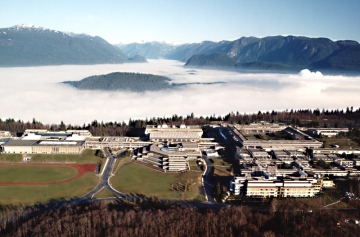
The University of British Columbia
UBC has an international reputation for leading research and academic programs at all levels, with 14 faculties offering more than 200 programs in undergraduate, graduate and continuing education studies. It's also B.C.'s only medical school.
Signature programs: Commerce, Science, Medicine, Film, Law
Location: Vancouver
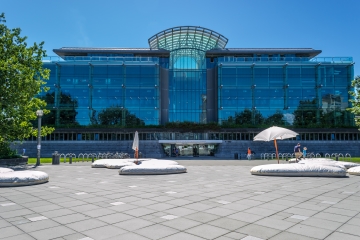
The University of Victoria
Ranked in the top 200 universities globally, the University of Victoria has a reputation for groundbreaking research that has carried itself around the world.
Signature programs: Biomedical Engineering, Economics, Social And Political Thought, Health Information Science
Location: Victoria
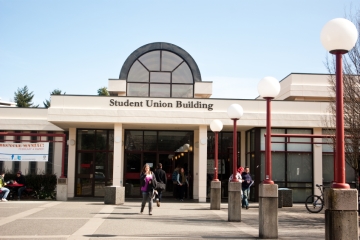
Camosun College
Camosun really takes care of its international students, having welcomed people from all over the world since 1983. Camosun is also one of Victoria's top employers, and a credential from the school is very well-recognized the larger community.
Signature programs: Trades and Technology, Engineering
Location: Victoria
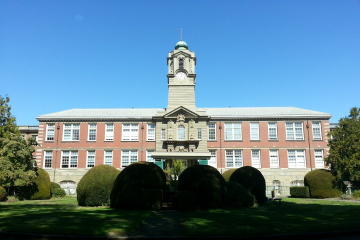
Other Select Schools in British Columbia
Select Schools are those that CanadaVisa has assessed for quality, value, and competency with international students. These schools are accredited by Colleges and Institutes Canada (formerly the Association of Community Colleges of Canada) or are chosen because of proven pathway programs and exemplary student services.
In order to apply for a Canadian study permit, prospective international students must first obtain a letter of acceptance from a Designated Learning Institution (DLI). As each institution may have different admission requirements and application processes, interested applicants may contact the desired institution(s) individually. Find out more about studying in British Columbia.
For a full list of DLIs by province, click here.
- The University of British Columbia: Commonly referred to as UBC, this is one of the highest-regarded universities in Canada, with a strong international reputation for research and academics. While research is a main focus, the university has recently developed partner programs with community groups, and students have access to a number of co-op placements and community involvement opportunities. UBC offers over 200 undergraduate programs in 14 faculties, including the province’s only medical school.
- Signature programs include Commerce, Sciences, Medicine, Film, and Law.
- Simon Fraser University: With its interdisciplinary approach and a three semester system, Simon Fraser University has some notably unique aspects. It is regularly ranked within the top universities in Canada, and worldwide.
- Signature programs include Kinesiology, Criminology, Computer Science, Business, and the Humanities.
- The University of Victoria: A lower student-teacher ratio and a small-town community setting lend an intimate feeling to this university, which nonetheless has big aspirations. Ranking within the top 200 universities worldwide, the University of Victoria — or “UVic” — is well-regarded abroad for its research. International tuition fees at UVic are among the lowest in the province for university-level education.
- Signature programs: Biomedical Engineering, Economics, Earth and Ocean Sciences, and Health Information Science.
- Okanagan College: Okanagan College is located in one of the warmest regions of Canada. It provides language training as well as vocational and trade programs to over 350 international students from over 30 different countries. International students receive help from cultural liaisons, who are native speakers of many different languages. Many courses taken at Okanagan College are transferable to universities in BC and across Canada.
- Signature programs: Associate of Science, Diploma Criminal and Social Justice, Diploma Writing and Publishing, Motor Vehicle Body Repair, and Carpentry.
- British Columbia Institute of Technology: Courses in high-tech and engineering dominate the schedule at this forward-thinking college. BCI.T. has a focus on hands-on experience, and students can benefit from facilities such as a new aerospace technology campus, with a fleet of aircraft to practice on. Certain programs lead to professional certification, easing the transition into the workplace for graduates.
- Signature programs: Business & Media, Applied & Natural Sciences, Engineering & Technical Studies, Computing & Information Technology, and Health Sciences.
- Camosun College: Over the past three decades, Camosun College has built a solid reputation for welcoming international students. Courses focus on hands-on teamwork and experimentation. Programs on offer include a wide variety of transfer programs, and a number of academic upgrading options for more advanced study programs at institutions such as the University of Victoria.
- Signature programs include Trades and Technology, Engineering, Upgrading, and University-Transfer programs.
- Due to the province’s prosperous natural resources industry, many students come to BC for programs in forestry, mining, and engineering.
- The variety of natural environments and ecosystems in BC also encourage many students interested in marine and animal biology, geography, and natural sciences. The University of British Columbia is the best university in Canada for environmental sciences, according to Maclean’s magazine.
- Arts students aren’t left behind. With a thriving counter-culture and many artistic communities, BC institutions are host to many popular Arts and Humanities programs. Vancouver’s Emily Carr University of Art + Design is the only Canadian institution ranked among the top 50 universities for art and design worldwide.
- In addition to the programs above, institutions across BC offer a broad range of programs.
Tuition for international students varies widely, depending on the institution and study program. As a rough estimate, international students in British Columbia may expect to pay around CAD $14,000 per year at a college. At the undergraduate level, international students may expect to pay between $18,000 and $25,000 per year at a university, depending on the program of study (certain specialized post-graduate programs may be more expensive). Language school and graduate school tuition may differ significantly.
- International students studying in Canada are required to purchase health insurance before arriving in Canada. Often, this is organized through the post-secondary institution.
- International students may be eligible for BC’s Medical Services Plan (MSP). The MSP is mandatory for anyone who lives in BC for six months or longer. International students are advised to apply for the MSP as soon as they arrive in BC, as it takes three months to become eligible for the MSP. Individual educational institutions may offer health plans for students before they become eligible for the MSP.
- If an international student is not eligible for MSP, he or she must subscribe to another healthcare plan.
In order to apply for a study permit, a potential international student must show that he or she has $10,000 in addition to tuition fees to cover living expenses in BC. This equates to $833 per month.
Below is an approximate estimation of living costs for students in BC. The actual figures may vary between urban and rural areas.
| Factor | Per month (approx.) | Per year (approx.) |
|---|---|---|
Accommodation (single, off-campus) | $730 | $8,760 |
| Food | $300 | $3,600 |
| Health insurance (MSP) | $75 | $900 |
| Clothing, miscellaneous | $150 | $1,800 |
| Recreation and entertainment | $150 | $1,800 |
| Transportation (central Vancouver price) | $91 | $1,092 |
| Phone bill | $60 | $720 |
| Internet | $50 | $600 |
| Utilities | $120 | $1,440 |
| Cost of living total | $1,726 | $20,712 |
International students in BC may have access to private loans on the same terms as Canadian citizens and permanent residents. Loans may be offered by banks, student organizations, or other groups. It is important to properly research loan options, and understand the interest and repayment plans, before committing to any contract.
Many organizations and institutions may offer scholarships or bursaries to international students studying in BC. For more information, students are encouraged to contact the international student services department of their institution.
Graduate programs in particular often have funding options for students pursuing a Master’s or PhD program. It is important to contact the educational institution directly for more information.
- As a popular study area across Canada, many BC universities and colleges offer Engineering programs.
- Simon Fraser University, the University of Victoria and the University of British Columbia are all ranked by Maclean’s magazine in the top 10 Canadian universities for Engineering.
- As a popular study area across Canada, many BC universities and colleges offer Computer Science and Technology programs.
- Simon Fraser University, the University of Victoria, and the University of British Columbia are both ranked by Maclean’s magazine in the top 10 Canadian universities for computer science.
- As a popular study area across Canada, many BC universities and colleges offer Nursing and health programs.
- Maclean’s magazine ranks the University of British Columbia third in Canada for its nursing program.
- Many colleges including Camosun College (partnered with the University of Victoria), the British Columbia Institute of Technology, and Okanagan College (partnered with UBC) offer recognized Baccalaureate Registered Nurse programs.
STEM is an acronym for Science, Technology, Engineering, and Mathematics. While careers in STEM fields are popular, there is no specific program entitled “STEM” in a BC college or university. Prospective students are encouraged to research programs in their particular area of interest. Use the School Search tool to research programs in these fields.
Employment in BC is growing rapidly, and 80 percent of jobs are in the services-producing sectors. Sectors that have witnessed the greatest growth in employment recently are the Finance, insurance, real estate, rental and leasing, Professional, scientific and technical services, and Business, building and other support services sectors.
The top industries in BC by employment figures, as of September 2016, are:
- Wholesale and retail trade
- Health care and social assistance
- Construction
For more information:
- Learn more about the economy and employment in British Columbia.
- Use the Canada Job Search Tool to look for open positions across British Columbia and Canada.
Graduates from a DLI in BC may apply for the Post-Graduation Work Permit after graduating from an eligible study program.
- The British Columbia Provincial Nominee Program (BC PNP) has two streams: Skills Immigration and Express Entry. The Express Entry stream is aligned with the federal Express Entry immigration system, allowing eligible applicants to receive priority processing of both their BC PNP application, and if nominated, their permanent residence application. Individuals who may not be eligible to enter the Express Entry pool may still be eligible for another BC PNP category. To find out more, select one of the following categories:
- International graduates who have completed their education at a school in British Columbia may be eligible to immigrate through the federal Express Entry immigration system. Graduates may be awarded a significant number of points on account of their high level of education. Moreover, international graduates of Canadian educational institutions may have obtained important Canadian work experience, another highly valued factor under the Express Entry system.
Situated between the Pacific Ocean and the Canadian Rockies mountain range, the more populated areas of BC experience a mild, temperate climate. Summers are warm at around 20°C or higher, and winters in the coastal regions are the mildest in Canada. Unlike most of Canada, winter temperatures rarely drop below freezing and snowfall is low — but rainfall is often high.
- The BC Transfer System allows students to undertake studies at one school and then transfer seamlessly to another, allowing for easier second- or third-year admission to some of the most competitive universities in the country. Many international students take advantage of academic upgrading programs at colleges like Columbia College and Douglas College, before transferring to another university.
- BC’s government is the only provincial government that endorses certain schools under an “Education Quality Assessment”. This helps international students choose schools that they may not have visited before, and offers them some consumer protection.
- BC’s best-known and largest city is Vancouver, world-renowned for its quality of life. It is one of Canada’s largest and most ethnically-diverse cities, and many immigrant communities are well-established throughout the city.
- BC’s provincial capital, Victoria, is located on Vancouver Island off the main coast of Canada. Several universities and colleges are located in Victoria, so the city has a large student population. Tourism and the hi-tech sector are both strong industries in Victoria.
- Kelowna, Abbotsford, and Kamloops are the next most populated cities after Vancouver and Victoria.

